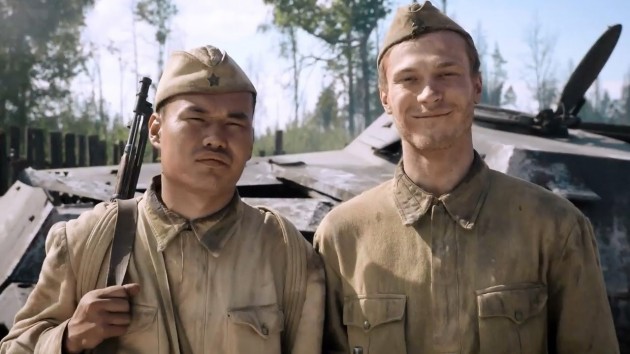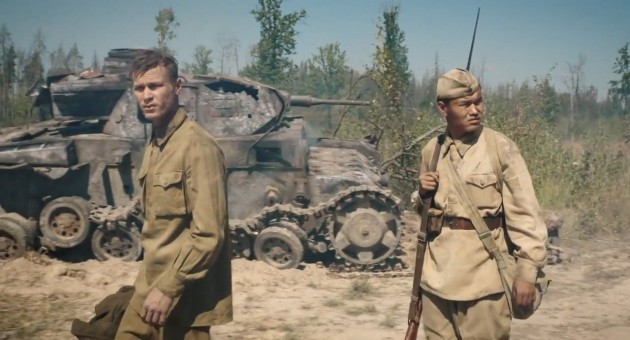The Fog of War
When I first began traveling to Moscow as a program administrator of a communications agency, the black and white hotel television consisted of old episodes of Dallas with all speaking parts read by a single gruff male voice. It was embarrassingly primitive and laughable.
Now more than two decades later comes a new film by Russian director Sergej Popov that completely destroys my notion of the state of film in Russia. This new film takes on the complexities of WWII military actions on the Ukrainian steppes. On the Road to Berlin (Doroga na Berlin) tells the tale of young lieutenant Ogarkov, a communications officer with important instructions to redeploy the 341st division. Before he is able to deliver the orders, the German army unexpectedly attacks and the division is surrounded. He is court martialed for failure to deliver the orders, and sentenced to death by firing squad.
All this may sound like standard warfare moviemaking. But Popov uses the fog of war to tell a touching tale of caring and understanding.
Ogarkov’s safe delivery to Central Command for verification of the order to carry out his death by firing squad is assured by his being assigned an armed escort – the Kazakh Dzurabauv. The silent Kazakh Dzurabauv is illiterate and homesick. He is loyal to his mission, but is disenchanted with the treatment he receives as a Kazakh. With the Germans about to overrun their position, he releases Ogarkov from his holding cell and they begin a journey that leads them through the rural countryside in their push toward Berlin, the rumored location of Central Command. V

On the way, the opportunity for Ogarkov to kill his escort and escape into the barren wilderness arises. But he cannot bring himself to do so. The two become dependent on each other as they elude German soldiers crisscrossing the steppes. One day a young boy from a nearby farm discovers the two slinking about in the fields. He informs them that his family has hidden a German pilot injured when his plane was shot down. The Kazakh is puzzled by Ogarkov’s insistence on giving aid to the pilot. Ogarkov says that the pilot, like himself and Dzurabauv, has a family that is concerned for him. He carries the pilot to a Russian field hospital where there are medical facilities to repair his wounds.
This is not out of character for Ogarkov. Earlier he has refused to pull his revolver in another encounter, and we begin to see that he has many of the characteristics of a pacifist unwillingly caught up in the machinery of war. Even when slightly wounded in another encounter, he refuses to raise his weapon. But when his gun bearing escort encounters life-threatening circumstances, Ogarkov comes to his rescue.
The Kazakh’s welfare has been neglected by the military in which he serves. The soles of his boots are mostly missing. When they reach a division of the Russian army with a supply tent, Ogarkov trades the precious watch given to him by his grandfather for a pair of new boots for Dzurabauv. This becomes one of several pivot points in the film that the director uses so effectively to hint at the new relationship that is developing between guard and guarded.

In spite of Ogarkov’s efforts, the Kazakh is killed by enemy fire. Ogarkov finds refuge in the barn of Germanic appearing woman whose husband died early on the front – another reluctant soldier. She invites him to stay with her, to take up the farm and forget the war. He responds that he must continue on to Berlin to the Central Command even though no longer compelled to do so by an armed escort. He has come to realize that his integrity rests on his willingness to appear before his superiors with his own death warrant in hand.
The screenplay on which this film is built is worth careful study. Masterfully crafted, it gives the director a solid foundation on which to build this impressive work. In turn, director Popov gives us a finely nuanced story that makes impressive use of his actors. Those with roots in Russia as well as anyone remembering the fear created by cold war antics will find this story touching. There is plenty here to engage one’s emotions. And it comes from an unexpected source. Or does it? Popov, together with the screenwriter, seems to be engaging in a serious reexamination of Russia’s WWII experience at a level that focuses sharply on the human cost of war.
The film had its world premiere at the Montreal International Film Festival. The ecumenical jury gave it a commendation for its portrayal of a deeply human story that reflects Christian values. I sat on the jury that made this award. It felt somewhat strange to be giving an ecumenical award for Christian values to a Russian producer for a story in which my German-speaking ancestors living on the Ukrainian steppes suffered incredible tragedies at the hands of both the German and Russian armies. But this film deserved the award. I hope there comes a time when it becomes available for others in North America to experience the pathos, the strong emotions and the joy of discovery that this film offers. Here we are again reminded that when we aspire to the highest values of humanity, we are in good company.

